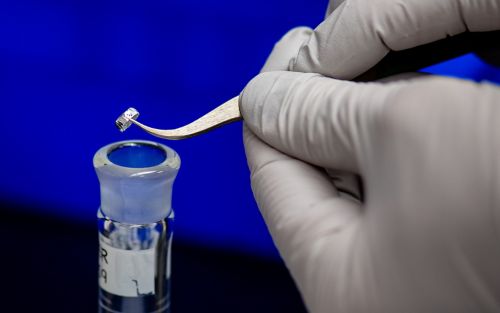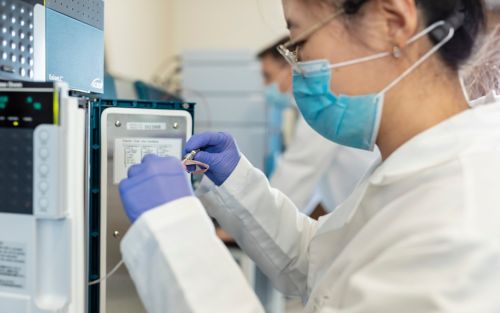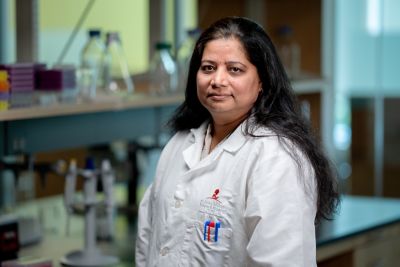St. Jude Family of Websites
Explore our cutting edge research, world-class patient care, career opportunities and more.
St. Jude Children's Research Hospital Home

- Fundraising
St. Jude Family of Websites
Explore our cutting edge research, world-class patient care, career opportunities and more.
St. Jude Children's Research Hospital Home

- Fundraising
Preclinical Pharmacokinetic Shared Resource
Preclinical pharmacokinetic (PK) assessments play a crucial role in the discovery and development processes for new chemical entities and can also be useful in enhancing the clinical use of currently available drugs.
OVERVIEW
The mission of the Preclinical Pharmacokinetics Shared Resource (P-PKSR) is to support and enhance PK and pharmacodynamic (PD) investigations executed in the preclinical setting or in the context of animal models. The P-PKSR is capable of small molecule bioanalyses in multiple matrices (plasma, tissue, organs) using HPLC and LC-MS/MS methodologies. To ensure the highest quality data, assays are typically validated using rigorous criteria derived from P-PKSR standard operating procedures, the FDA Guidance for Industry: Bioanalytical Method Validation, and the 2007 AAPS report on best validation practices.


IMPACT
Preclinical pharmacokinetic (PK) assessments play a crucial role in the discovery and development processes for new chemical entities and can also be useful in enhancing the clinical use of currently available drugs. When coupled with in vitro or in vivo pharmacodynamic (PD) and tolerability data, preclinical PK can provide the foundation for rationally designed therapeutic regimens. Such regimens have the potential to increase efficacy, reduce toxicity, and accelerate therapeutic development in the clinic. The P-PKSR staff has a combined experience of over 30 years in bioanalytical methodologies and PK/PD analyses, in both academic and industrial drug discovery/development settings.

The Preclinical Pharmacokinetics core helped us to design novel drug treatment studies in our model systems using agents known to have some effects in patients. This type of resource is not available or accessible to translational investigators in many other places.
Esther Obeng, Assistant Member
Equipment and capabilities
- Highly sensitive and specific analytical equipment, providing very low limits of quantitation (0.1-10 ng/mL) from small volume samples with notable precision and accuracy
- SCIEX Q-TRAP 5500 LC-MS/MS system with PAL HTS-xt autosampler
- Two (2) SCIEX Triple Quad 3500 LC-MS/MS systems
- Shimadzu 20 series HPLC system, with autosampler and UV/PDA detector
- Mettler-Toledo XP-26 microbalance (dynamic range: 1 μg – 22 g)
- SCIEX Q-TRAP 5500 LC-MS/MS system with PAL HTS-xt autosampler
- Advanced sample processing and preparation
- Labconco CentriVap vacuum assisted evaporator
- MP Biomedicals FastPrep-24 small volume tissue homogenizero
- CO2 incubator and RED
- HT96 equilibrium dialysis devices for in vitro plasma protein or tissue homogenate binding studies
- Labconco CentriVap vacuum assisted evaporator
- Secure, electronically monitored -20°C and -80°C freezers for shorter-term sample storage.
- Various software packages for sophisticated data analysis and model fitting:
- Certara Phoenix WinNonlin with NLME
- ADAPT5
- NONMEM (accessible on HPC cluster)
- MonolixSuite
- CRAN R with RStudio.
P-PKSR by the numbers
25+
More than 25 peer-reviewed publication contributions
P-PKSR by the numbers
94
94 PK-related projects since 2011
P-PKSR by the numbers
20+
More than 20 PI partnerships
P-PKSR by the numbers
14
Average impact factor of publications
Director

Burgess B. Freeman III, PharmD
Director, P-PKSR
burgess.freeman@stjude.org
The Team

- William Caufield, PhD
- Senior Scientist

- Harini Jogiraju, PhD
- Senior Researcher

- Lindsey Wang, PhD
- Lead Researcher